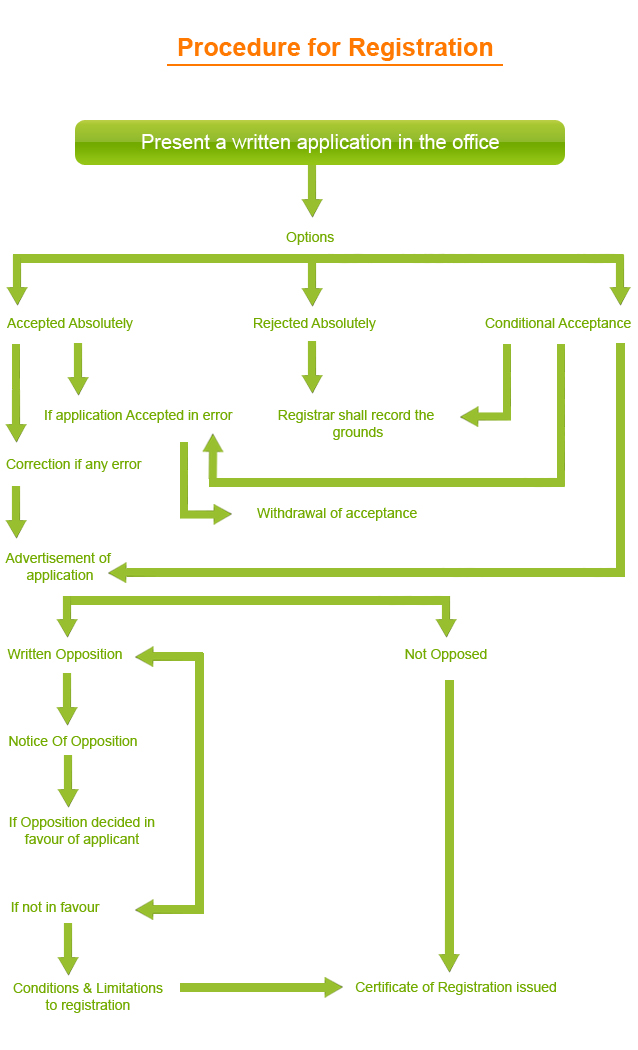Procedure for Registration of Trade Mark
The application for registration of trade mark for various purposes, etc., shall be made in Forms, TM-1, TM-2 TM-22, TM-37, TM-45, TM-51, TM-52, TM-53, TM-61, TM-64, TM-65, TM-66 and TM-68, as provided in Schedules of the Trade Marks Rules, 2002. The application can also be signed by the agent of the applicant. A single application can also be made for different class of goods or services included in any one class from a convention country. A single application can also be made for series trade marks.
Where an applicant files a single application for more classes than one and the Registrar determines that the goods or services applied for fall in class or classes in addition to those applied for, the applicant may restrict the specification of goods or services to the class applied for or amend the application to add additional class or classes on payment of the appropriate class fee and the divisional fee. The new class creates through a division retains the benefit of the original filing date or in the case of application from a convection country, the convection application date under sub-section (2) of section 154, provided the claim was otherwise properly asserted in the initial application.
Advertisement of Application
According to the rule 43, an application for registration shall be advertised in the trade mark journal ordinarily within six months of the acceptance of the application or after the expiry of the period referred to sub-section (2) of section 154 whichever is later. Where a trade mark applied for is other than a word, the Registrar may call upon the applicant to furnish a camera-ready copy of the trade mark.
The Registrar may, after informing the public in the trade mark journal, put the applications published in the journal on the internet, website or any other electronic media. The Registrar may, after informing the public in the trade mark journal, make available in the journal in CD-ROM on payment of cost thereof. Where an application relates to a series of trade marks differing from one another in respect of the particulars mentioned in sub-section (3) of section 15 of 1999 Act, the Registrar may, if he thinks fit, insert with the advertisement of the application a statement of the manner in which the several trade marks differ from one another.
A notice of opposition to the registration of a trade mark shall be given in triplicate in Form TM-5 within 3 months or within such further period not exceeding one month in the aggregate from the date the journal is made available to the public.
Trademark Registration Process in India
The best reason to hire these services is to save time. You want to get things right the first time around and hence you need someone that is highly efficient and can take care of all your registration requirements.
The Trademark registration process in India is highly time consuming and when you have a professional service provider, you have to stop worrying about the trademark registration and you can instead focus on how you can make your business grow.
It is a complicated process and if you do not have the right guidance, you will be at a loss, as you may have to do things again and again until you get them right.
Trademark Registration Cost in India
If you wish to find out the trademark registration cost in India, you should speak to a consultant who will be able to give you an idea of all the costs involved and will also be able to help you with the procedure.
There are indeed a number of consultants in the market, who can help you out with this information, however there are not many that you can absolutely trust for the entire process. Be wise when it comes to the trademark registration consultant, as this association should involve you saving a lot of time in the long run.
Procedure for Registration of TradeMark India
If you want to know what the procedure for registration of trademark India is, the best person to get in touch with is a consultant who can help you with the same. A registration consultant will not only help you understand what the procedure is, but will also help you go about the entire procedure so that you don’t end up wasting too much time.
Speak with a registration consultant, learn the procedure and then find out how they can help you with getting your trademark registration out of the way with the least bit of effort from your side.
Opposition to registration
-

-
-
Section 21 of the Trade Marks Act, 1999 provides for opposition to registration. Any person can give notice in writing of opposition to the registration within three months from the date of advertisement or re-advertisement of an application for registration.
In a case the Madras High Court observed that the Trade Marks Act, 1999 is a special Act. It gives a special right to the parties who want their goods and services to be protected by getting a registration of the trade mark. Anybody who is keen to oppose any such registration has also to be vigilant and has to oppose the registration in the prescribed manner, in the prescribed time, an on payment of prescribed fee within the time provided for that purpose. The counter-statement is also to be filed in the prescribed time and in the prescribed manner. The notice of opposition and the counter-statement are like the plaint and the written statement of the proceeding. If the special Act provides for specific time, manner and fees for filing of the plaint, it has to be so done in compliance and the requirements cannot be relaxed. Sub-section 21(7) of the Act provides only for amendment, but that cannot be constructed as a provision to cure any deficiency in the requirement of sections 21(1) and 21(2) of the Act. Section 131 and rule 53 can also not be pressed into service, since that section will apply only where time is not expressly provided under that statute and rule 53 is concerning the time for leading the evidence. It cannot apply to filing of notice of opposition or the counter-statement . Any other interpretation will defeat the objective of the Act;
Allied Blenders and Distillers Pvt. Ltd., Mumbai v. Intellectual Property Appellate Board, Chennai, AIR 2009 Mad 196: 2009 CLC 1433: 2009 (7) Mad LJ 36.
Where the counter-statement under section 21(2) was filed within the prescribed period, but was deficient in fee by Rs. 20 and it was not made good in time. The Delhi High Court held that the Registrar was justified in making an order about abandonment; Seiko Cables of India v. Hattori Seiko Company Ltd., 2002 (24) PTC 558 (Del).
Registration of Trade Mark
Where no notice of opposition to an application advertised or re-advertised in the journal is filed within the specified period. Or where an opposition is filed and it is dismissed, the Registrar shall, subject to the provisions of sub-section (1) of section 23 or section 19, enter the trade mark on the register.

Absolute grounds for refusal of registration
Section 9 of the 1999 Act lists the following grounds being absolute grounds for refusal of a trade mark:
- such trade marks which are devoid of any distinctive character, that is to say, not capable of distinguishing the goods or services of one person from those of another,
- trade marks which consist exclusively of such marks or indications which may serve in trade to designate the kind, quality, quantity, intended purpose, values, geographical origin or the time of production of the goods or rendering of services or other characteristics of the goods or services,
- such trade marks which consist exclusively of marks or indications which have become customary in the current language or in the bona fide or established practices of the trade.
However, a trade mark shall not be refused registration if before the date of application for registration, it has acquired a distinction character as a result of the use made of it or if it is already a well known trade mark.
A mark also shall not be registered as a trade mark if:
- it is of such nature as to deceive the public or cause confusion,
- if it contains or comprises of any matter likely to hurt the religious susceptibilities of any class or sections of citizens of India,
- if it comprises or contains scandalous or obscene matter,
- if its use is prohibited under the Emblems and Names (Prevention of Improper Use) Act, 1950
A mark shall also not be registered as a trade mark if it consists exclusively of:
- the shape of goods which result from the nature of goods themselves, or
- a shape of goods which is necessary to obtain a technical result, or
- the shape which gives substantial value to the goods.
However, for the purposes of section 9, the nature of goods or services in relation to which the trade mark is used or is proposed to be used shall not be ground for refusal of registration.
Relative grounds for refusal of registration
Section 11 of the 1999 Act lays down that a mark shall not be registered as trade mark if there is likelihood of confusion caused to the public including the likelihood of association with an earlier trade mark by virtue of its identity with the earlier trade mark and similarity of goods and services caused by the earlier trade mark or by virtue of its similarity to an earlier trade mark and identity or similarity of the goods or services caused by the earlier trade mark.
A trademark shall not be registered if the earlier trade mark is well known trade mark in India and the later mark would take unfair advantage of the earlier mark or would be detrimental to the distinctive character or repute of the earlier trade marks.
A trade mark shall also not be registered if its use in India is liable to be prevented by virtue of any law of passing off protecting an unregistered trade-mark used in the cause of trade or its use in India is liable to be prevented by virtue of law of copyright.
However, if the proprietor of the earlier trade-mark or proprietor of other earlier right consents to the registration of the later trade mark, the same may be registered by the Registrar.
However, a trade mark shall not be refused Registration on the above grounds unless objection in opposition proceedings by the proprietor of the earlier trade mark.
Section 11(6) lays down the facts relevant for determining a trade mark as a well known trade mark by the Registrar.
However the 1999 Act has done away with the system of maintaining registration of trade marks in Part A and Part B of the register with different legal rights. The 1999 Act provides only for a single register with simplified procedure for registration and with equal rights.
The element of distinctiveness remains the best significant criterion for registrability of a mark as trade mark.






